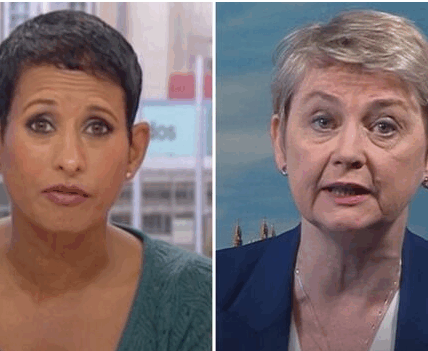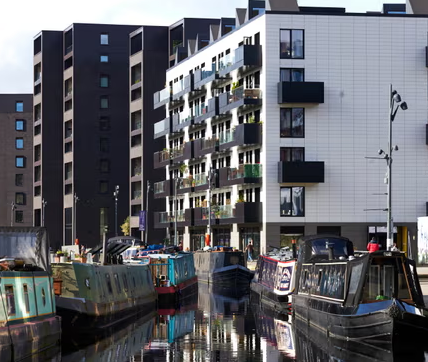In one of the country’s most famous fishing towns, British rules and regulations seem to be hindering the industry far more than post-Brexit agreements.
In one pretty Devon seaside town, its renowned fishing industry isn’t just being tested to the limit by post-Brexit agreements but by homegrown rules and regulations that are making it harder and harder for businesses to survive. Expensive qualifications for newcomers, strict rules for smaller boats and fishing quotas are just some of the factors creating uncertainty about a future some fear is bleak.
Yet despite clear frustration, there’s a strong sense of pride and passion in Brixham, England’s biggest fishing port by value. The fishermen hail their job as deeply rewarding, offering a rare sense of freedom that few other roles provide. Many wish it was easier for young people to enter the trade, and say current costs make that difficult. Rules are also tough on small, one-boat operations, which struggle to compete with much larger commercial vessels. As we wander through the pastel-coloured town that curves around a bustling fishing harbour, we hear how the industry has changed, and what locals hope the future could look like.

Tristan Northway, who goes by ‘Mr Fish’ online (Image: Jonathan Buckmaster)

Brixham is a pretty fishing village in Devon (Image: Jonathan Buckmaster)
Tristan Northway tells us the mounting costs and regulations forced him, after 27 years, to leave his fishing career, where he had worked on trawlers, owned his own boat, and even built a business selling fish direct to customers.
He tells us it’s “getting even harder” for one-boat operations, which he used to be, before selling after his 8-metre boat didn’t meet stability rules brought in by the Marine and Coastguard Agency in 2021 for vessels under 15 metres [which are designed to reduce the risk of small boats capsizing].
“I didn’t give up. I fought for it. And eventually just had to step to one side and just say OK, and do something else,” he says. “Unless I had a really deep pocket, I didn’t want to be climbing out of a hole that I was already deep into anyhow.
“I’ve cut my losses and started something else, and it’s a shame because the boat that I had at the time was a huge part of my life. To just push that to one side and start doing something completely different, it was hard.”
He turned to the tourism industry 18 months ago, and takes passengers out onto the water to catch mackerel and explore Brixham.
The ex-fisherman says it is “more of a job than a way of life now”, adding “there’s no one coming into the industry,” and predicts the future of fishing lies in “multipurpose, highly efficient, small boats” run by larger companies.
Tristan says the companies can afford to modify small boats to do the work of larger ones – an option out of reach for many small fisheries – adding that inshore boats under 10 metres now cost nearly £1 million, whereas before they could be picked up for £100,000.
He says: “It’s a lot easier for the government to issue out quotas to a handful of boat owners. It might not happen straight away, but you can definitely see a decline in small inshore fisheries.”
Like others we meet, he says many companies now hire overseas crews, a shift which may change the root of the town’s economy from fishing to tourism.
He explains: “You used to have English crew that would come out and drink in the pubs, and take their missus out through the winter, just keep the local businesses just ticking over. Now we haven’t got [that] because the crew stay on board the boat.”

Shaun Sturtridge has worked as a fisherman his whole life (Image: Jonathan Buckmaster)
We chat to Shaun Sturtridge, a lifelong fisherman who has worked his way up from deckhand on a 28-metre boat to owning his own small vessel. He has also been impacted by domestic regulations, which he believes is a larger issue than EU vessels fishing in UK waters.
His boat, which he said had been safely fishing for 22 years, was also deemed unsafe due to the stability criteria brought in by the MCA, and he believes it will cost £150,000 to get it up to scratch, which is roughly what it cost him in the first place.
Safety regulations are not applied retrospectively to other older vehicles; for example, cars that were not originally equipped with airbags are not required to have them installed.
In an ideal world, he’d like to see real change in the industry: “The MCA has to start playing ball, and then quotas have to be made readily available to the individuals who want to go forward.
“They all moan there’s nobody in the industry anymore, but if you look around, all the young lads, they’re all on boats this size now. They used to be on big ones, but there’s no end goal.”
He said that while skippers of larger boats make good money, they would have no one to pass the business onto, because everyone now uses smaller boats, and complex regulations mean each part of the industry has different rules to adhere to.
“You’ve got the under tens competing with the big boats because of the quota, and then you’ve got the crabbers, whelkers, everybody, there are rules for such different things,” he adds. “Everybody’s just at each other. There’s no agreement. We’re not unified, are we?”
Speaking about French fishermen being allowed in the waters, he was “not really” bothered. “We got more sh*t in this country. If you look at all the other countries with a fishing industry, they’re not like us, we’re so divided.”
While he says that Brits should be allowed into the same mile radius as the French, he adds: “It doesn’t really hurt us, you know?” He says they only come into UK waters when “it’s absolutely screaming a gale” to be safer, and they leave as soon as the weather brightens.

Tristan Northway has now had to change career to the tourism industry (Image: Jonathan Buckmaster)
Although the deal under the original Brexit agreement was due to expire next year, the UK has agreed to maintain the right for EU vessels to fish in UK waters until 2038. Tristan was more ruffled about this, even though the stability rules are his primary angst.
He explains: “Now with old Starmer, they’re still allowed into our six-mile limit, but we’re not allowed into their 12.”
He tells us in an ideal world, everyone would keep to their own waters, but adds: “It’s always been the same with the French fishermen. When they don’t agree with something, they all get together, kick off, and they’re listened to.
“If the English fishermen did what the French did, we’d probably have our licences revoked because we stopped the ports. If we did that here, well, there’d be f***ing uproar man. But the French, they just do what they want, basically.”
We then chat to crab fisherman Lewis Maine, who is tying up his crab pots ready to sell after moving from Guernsey, where he said the regulations were making it impossible for fishermen to make a living.

Lewis Maine has always been a crab fisherman (Image: Jonathan Buckmaster)
Now 35, he’s been fishing since school, but believes young people are not being encouraged to get into the industry that he loves.
He says rising sea temperatures have changed everything, with species like tuna and slipper lobster appearing in the English Channel, and crucially for him, octopus, which eat crabs.
Despite the challenges, he plans to stick in the industry, and says: “We’ve just got to adapt to what’s going on,” joking that he may even become an octopus fisherman in the future.
He wishes fishing was portrayed in a more positive light, as he says “being on the boat is freedom” and it’s “in his heart.”
His friend chimes in: “It’s nice having the freedom. We see things that we take for granted that other people would never see in their life.”
The friend adds that paperwork and the cost of qualifications has “stopped the young people coming” whereas before, “you’d get a young lad just turn up on the quay, asking ‘can I come out and try it?'”

Fishmonger Darren Whelen believes young people are not helped into the industry (Image: Jonathan Buckmaster)
Darren Whelen, a Brixham fishmonger, has noticed the same trend among younger people. As he expertly fillets a fish, he tells us: “We’re very much a society of, get the grades and get the office job.
“No one’s been talking about, actually there are other jobs and trades that need to be done. You don’t necessarily need a formal education here, you just need common sense and just get on with it.”
As well as the barrier of paying for qualifications, he says the ability to earn money through social media has shifted young people’s ambitions, so few want to start on the minimum wage and work their way up.
He adds: “The last 10 years, I’ve worked for various places, and we’ve struggled with personnel. It’s very hard to get somebody who’s 17 or 18 from school to apply.
“I think getting young people in is very difficult. It’s a struggle and I don’t know what’s best because it’s not just us feeling it, it’s the hospitality sector too.”
He tells us it’s a hard job but a rewarding one, so “if you’re happy to do the graft you’ll get paid, but you’ve got to do those years of graft”.
He worries that the future is “bleak” believing fishing is treated as a bargaining chip in EU negotiations, unlike in Europe where he says the industry is more valued. He adds: “We’re an island surrounded by water, yet we don’t really appreciate that.
“My fear is how much longer we’ve got with the quotas that we’ve got. We’ve got 12 more years of quotas coming down. After those 12 years, what happens next?”
He adds that lower quotas, leading to less supply, have pushed prices up, which he adds is “great for the fishermen, because they’re making up the money they should be”.
“I think fish has been quite cheap for quite a long time. I don’t think we really appreciate it as a country what it takes to catch fish,” he explains.

The town still hums with activity at the harbour front, even though it is pivoting towards tourism (Image: Jonathan Buckmaster)
As we walk along the harbbour, a boat maintenance worker, who chooses to remain anonymous, tells us: “There’s no youngsters coming into it. They can go and flip burgers for £500 a week,” adding that it is not helped by larger companies employing mainly foreign workers who speak a different language.
He says young people are not interested in going to sea, even though boats are kitted out “better than homes”, with wi-fi, washing machines, tumble dryers, fridge freezers and food onboard.
Explaining what the Government is doing to support the country’s fishing industry, a Defra spokesperson said: “This Government is working with the fishing industry to promote British seafood and ensure we fish sustainably so the sector can thrive for generations to come.
“We have announced the £360 million Fisheries and Coastal Growth Fund to support the next generation of fishers and will work with the industry to target investment where it matters most.”
And in response to the concerns raised in Brixham about stability rules, a Maritime and Coastguard Agency spokesperson said: “Fishing is still one of the UK’s most dangerous jobs, with fatalities often linked to vessels capsizing. That’s why we brought in tougher stability rules in 2021 for boats under 15 metres.
“We’re also backing the next generation of fishers by funding free safety training through Seafish, helping young people get started in the industry safely and confidently.”

Brixham Harbour looking resplendent on a summer’s day (Image: Jonathan Buckmaster)


